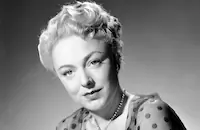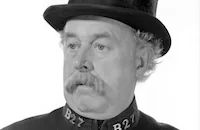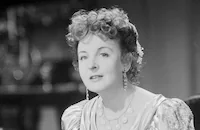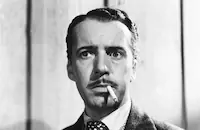The Imperfect Lady
Cast & Crew
Lewis Allen
Ray Milland
Teresa Wright
Sir Cedric Hardwicke
Virginia Field
Anthony Quinn
Film Details
Technical Specs

Synopsis
In Middleford, England, in 1892, underpaid variety show dancers Millicent Hopkins and her friend, Rose Bridges, go in search of a meal at the tailor shop of Rose's father. Mr. Hopkins disowned Millie when she became an actress, and now throws her and Rose out. While riding in a cab, Rose and Millie pass a political rally for liberal candidate Clive Loring, who seeks refuge in the cab when he is heckled. When Clive invites Millie and Rose to tea, they pretend to be ladies, and Clive is impressed with Millie's views on women's rights. The next day she attends his rally and misses her acting troupe's train. After she vows to give up acting, Millie's father reconciles with her. She spends the next day with Clive, and they fall in love. Clive's class-conscious older brother, Lord Belmont, convinces Millie that, for the sake of Clive's career, he must marry within his class, and she returns to the stage. One night, Millie tries to avoid seeing admirer Lord Montglyn after the show, and leaves with Rose while they are still in their stage makeup. When the women are mistaken for prostitutes by a constable, Millie accepts a stranger's offer to take refuge in his nearby apartment--number 17--which is Millie's lucky number. The man, Jose Martinez, turns out to be an accomplished pianist from Spain with a penchant for lavender perfume, who has become impoverished in England. Although Millie declines his advances, Jose maintains a good humor and plays one of Chopin's nocturnes for her. After hours of innocent conversation, Millie returns home. The next day, Jose is arrested for the murder of a moneylender named Edward Simpson, whom Jose had visited before he met Millie, and Millie is his only alibi. Clive, who has won a seat in Parliament, eventually locates Millie, and they marry. During a reception given by Lord Belmont, Rose warns Millie that the police are looking for her so that she can testify at Jose's murder trial. That night, Clive sees that Millie is disturbed by lavender-scented linens and questions her about it, but she denies its importance. The next morning, when a Scotland Yard detective named Carston visits, Millie denies knowing Jose. Lord Belmont, suspicious of Millie, attends the opening day of the trial and learns that the missing witness was superstitious about the number seventeen and liked Chopin's "Nocturne." At home that night, Lord Belmont tricks Millie into admitting those two facts, and she flees to Rose's apartment. Clive now believes Millie is guilty of improper behavior, and tells Rose that although his and Millie's marriage is over, Millie has a moral obligation to come forward to save Jose's life. Jose is found guilty, and on the day of his sentencing, Millie enters the courtroom. With Clive in the audience, Millie testifies that she spent an innocent night with Jose to escape the police. The confession makes headlines across London, and stuffy members of Parliament call for Clive's resignation. Clive defends Millie's character to them, and later finds Millie at her father's shop and asks her to return to him.

Director

Lewis Allen
Cast

Ray Milland

Teresa Wright

Sir Cedric Hardwicke

Virginia Field

Anthony Quinn

Reginald Owen

Melville Cooper

Rhys Williams

George Zucco
Charles Coleman

Miles Mander
Gordon Richards
Edmond Breon
Frederic Worlock
Michael Dyne
Joan Winfield
Lilian Fontaine
Leyland Hodgson
Bob Stephenson
John Goldsworthy
Olaf Hytten
Jack M. Lee
Major Sam Harris

Doris Lloyd
Harry Allen
Gavin Muir
Ted Billings
Beverly Johnson
Beverly Thompson

Margaret Field
Lucy Knoch
Margot Morgan
Mavis Murray
Renee Randall
Kay Deslys
Craufurd Kent
George Jenner
Frank Hagney
Herbert Evans
Bruce Carruthers
Frank Baker
Renee Evans
Doreen Munroe
George Broughton
Robert Cory
Stanley Mann
William O'brien
Charles Dunbar
Tommy Hughes
Larry Dods
Hilda Plowright
Roberta Jonay
Dorothy Barrett
George Atkinson
James Logan
Dave Pepper
Sanders Clark
Winifred Harris
Gwendolyn Logan
Colin Hunter
Wilson Benge
Eric Wilton
Keith Hitchcock
Heather Wilde
Lumsden Hare
Roberta Daniel

Boyd Irwin
C. Montague Shaw

Harry Cording
Bill Nind
Harold De Becker
Bob Ingersoll
Alex Pollard
John Rice
Tom P. Dillon
Arthur Gould-porter
Al Ferguson
Guy Bellis
Gloria Williams
John Sheffield
Frederic Nay
Crew
Franz Bachelin
Sam Comer
Billy Daniels
Hans Dreier
Wilma Duncan
Josephine Earl
Farciot Edouart
William Forsythe
Hilda Grenier
Gordon Jennings
Paul Lerpae
Harry Lindgren
Duncan Mansfield
Joel Moss
Dorothy O'hara
Helen Gladys Percey
Harry Perry
Otto Pierce
John F. Seitz
Gile Steele
Karl Tunberg
Karl Tunberg
James M. Walters
Wally Westmore
Philip G. Wisdom
Victor Young

Film Details
Technical Specs

Articles
Teresa Wright (1918-2005)
She was born Muriel Teresa Wright in New York City on October 27, 1918. She showed a keen interest in acting in grade school, and by the time she was 19, she made her Broadway debut in Thorton Wilder's Our Town (1938); the following year she scored a hit as Mary, the weeping ingénue in Life with Father (1939). The word was out that New York had a superb young acting talent on hand, and Samuel Goldwyn soon brought her to Hollywood for William Wyler's adaptation of Lillian Hellman's The Little Foxes (1941). She scored an Oscar® nomination for her film debut as Regina Giddens' (Bette Davis), honorable daughter, Alexandria.
She maintained her amazing momentum by scoring two Oscar® nominations the following year for her next two films: as Carol Miniver in Wyler's Mrs. Miniver (Best Supporting Actress Category), and as Lou Gehrig's (Gary Cooper) faithful wife Ellie in Pride of the Yankees (Best Actress Category), and won the Oscar for Miniver. Yet for most fans of Wright's work, her finest hour remains her perfectly modulated performance as young Charlie in Alfred Hitchcock's masterpiece, Shadow of a Doubt (1943). Wright's performance as the self-effacing, impressionable young niece who gradually realizes that her beloved uncle (Joseph Cotton) may have murdered several widows is effective since Wright's air of observation, subtly turns from idol gazing, to a watchful air of caution as the facts slowly being to unravel. 60 years on, fans of Hitchcock still acclaim Wright's performance as an integral part of the film's classic status.
She proved her talents in comedy with the delightful Casanova Brown (1944), but then saw her schedule slow down due to domesticity. After she married screenwriter Niven Busch in 1942, she gave birth to son, Niven Jr., in 1944, and took two years off to look after her family. She soon returned to film with another Wyler project, the Oscar®-winning, post war drama, The Best Years of Our Lives (1946), playing Fredric March's level-headed daughter, Peggy, she again took some time off after giving birth to her daughter, Mary in 1947. On her second attempt to return to the big screen, Wright found her popularity on the wane. Her wholesome image was in sharp contrast of the tougher, more modern women in post-war Hollywood, and her stubborn refusal to pose for any swimsuit or cheesecake photos to alter her image led to her release from Sam Goldwyn's contract.
As a freelance actress, Wright still found some good roles, notably as a young widow in the thriller scripted by her husband, in The Capture; and as a faithful fiancée trying to help Marlin Brandon deal with his amputation in Stanley Kramer's The Men (both 1950). Yet within a few years, she was playing middle-aged mothers in film like The Actress (1953), and The Track of the Cat (1954), even though she was still in her early '30s. By the mid-50s she found work in live television, where she could apply her stage training, in a number of acclaimed shows: Playhouse 90, General Electric Theater, Four Star Playhouse, and The United States Steel Hour.
She took a break from acting when she married her second husband, the playwright Robert Anderson in 1959, (she had divorced her first husband, Busch, in 1952) and was out of the public eye for several decades, save for an isolated theater appearance. When she did return, it was intermittent, but she was always worth watching. In James Ivory's Roseland (1977), a portrait of the New York dancehall; she was poignant as a talkative widow obsessed with her late husband; and as an enigmatic old actress in Somewhere in Time, she nearly stole the picture from leads, Christopher Reeve and Jayne Seymour. She was still active in the '90s, appearing a few hit shows: Murder, She Wrote, Picket Fences; and a final film role in John Grisham's The Rainmaker (1997). She is survived by her son, Niven; daughter, Mary; and two grandchildren.
by Michael T. Toole

Teresa Wright (1918-2005)
Quotes
Trivia
Notes
This film's working titles were Take This Woman, I Take This Woman and Lady 17. According to Hollywood Reporter, Paramount paid $50,000 for the screen rights to Ladislas Fodor's story. Paulette Goddard was originally considered for the starring role in the picture. A pre-production news item in Hollywood Reporter states that Arturo de Cordova was cast in a lead role in this film; however, he did not appear in the final picture. The Imperfect Lady was the last released film of long-time character actor Miles Mander, who died in February 1946. Mander also appeared in the 1946 Columbia film The Walls Came Tumbling Down (see below), which was shot at approximately the same time as The Imperfect Lady, but was released earlier. Interiors for the film included a replica of London's Old Bailey courtroom as it appeared in 1892. Paramount News reported that technical consultant Hilda Grenier was formerly the Royal Dresser to Queen Mary, wife of George V of Great Britain.

Miscellaneous Notes
Released in United States Spring April 25, 1947
Released in United States Spring April 25, 1947













